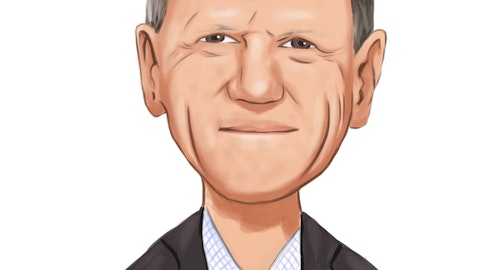Ryan Lynch: Okay. Understood. I appreciate the time today.
Operator: Your next question comes from the line of Robert Dodd with Raymond James. Your line is open.
Robert Dodd: Hi guys. I just want to go back to one of the visible trends you pointed out in terms of the health care services. I mean when we look at the Altman index in your portfolio, I mean health care has seen I think margin expansion in this most recent quarter. So, there’s that. Is there any connection between that industry and the increase in kind of Category 3 assets given – I mean you do – it’s 8% of your portfolio? If consumers learned anything in COVID as some health care things I think are maybe more discretionary than they thought in years past. I mean is there any connection between those issues, or any color there?
David Golub: I think it’s fair to say, Robert, that we’ve had a higher proportion of our credits — problem credits – we’re good at avoiding problem credits, but we don’t avoid them entirely. We’ve had more in health care than I think in other sectors. And I anticipate that’s a trend that’s going to continue for a bit.
Robert Dodd: Okay, appreciate it. Thank you.
Operator: Your next question is from Jordan Wathen with Wells Fargo. Your line is open.
Jordan Wathen: Hi. You’ve mentioned international exposure in the portfolio as something you watch on the potential credit risk. I’m curious if you view this as currency risk or different behavior from sponsors internationally, or just your views on growth outside the US? Any color you can give there on what in particular concerns you about international businesses more than others?
David Golub: Sure. So, flash back to summer of 2022, the US has raised interest rates very rapidly, faster than we’ve ever raised interest rates before. That in turn has had a very significant impact on currency exchange rates. We believe that many companies were not expecting those changes. And that hedging forward exchange rate movements is very challenging for most companies. So we wanted to take a new look at cost structures and revenue structures for our portfolio with a real focus on companies where there were revenues in one currency and expenses in the second currency to determine whether they had found themselves in a difficult spot. There were some other factors as well. We also put on the list, related to the war in Ukraine and changes in trading patterns, associated with the war in Ukraine, but the major area that we found ourselves focused on was FX.
Jordan Wathen: All right. Great. Thank you. That’s all for me.
Operator: There are no further questions at this time. I will now turn the call back to the presenters for closing remarks.
David Golub: Great. Thank you all for attending today. We appreciate your time. And as always, should you have any questions prior to our next quarterly scheduled call, please feel free to reach out. Look forward to talking to you all in three months.
Operator: Ladies and gentlemen, thank you for participating. This concludes today’s conference call. You may now disconnect.
Follow Golub Capital Bdc Inc. (NASDAQ:GBDC)
Follow Golub Capital Bdc Inc. (NASDAQ:GBDC)
Receive real-time insider trading and news alerts




